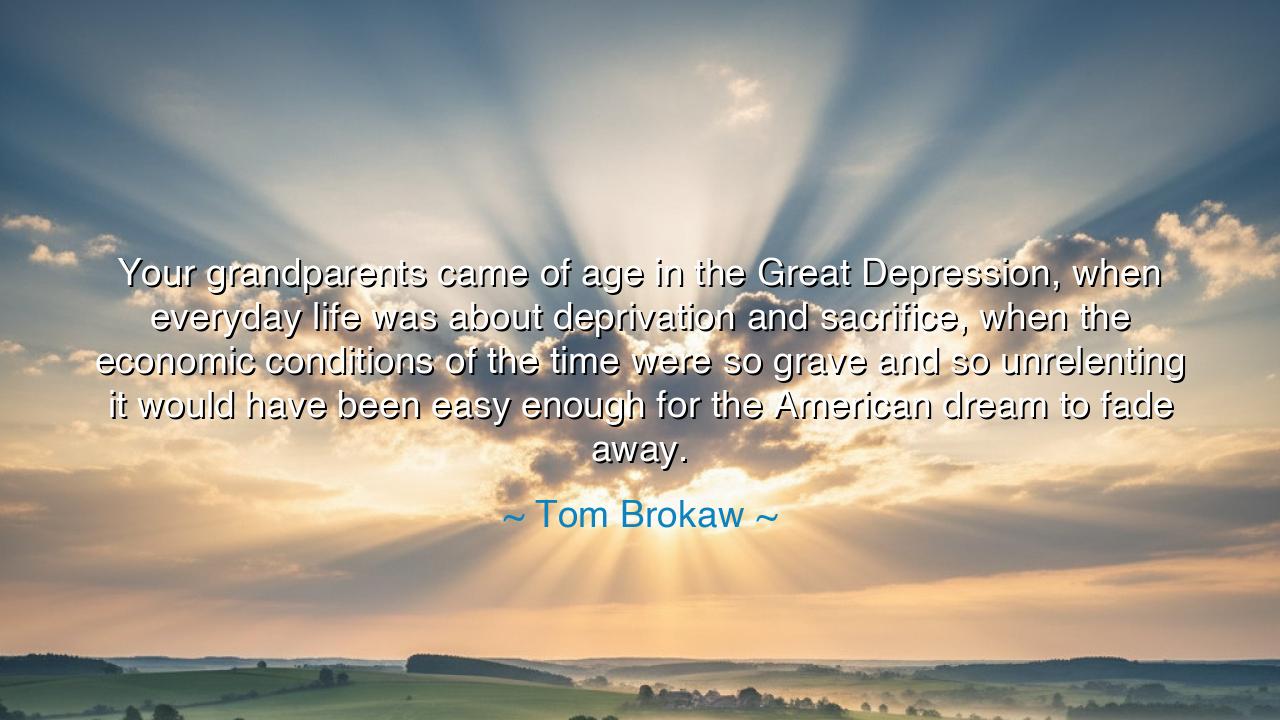
Your grandparents came of age in the Great Depression, when
Your grandparents came of age in the Great Depression, when everyday life was about deprivation and sacrifice, when the economic conditions of the time were so grave and so unrelenting it would have been easy enough for the American dream to fade away.






The venerable journalist Tom Brokaw, chronicler of courage and conscience, once said: “Your grandparents came of age in the Great Depression, when everyday life was about deprivation and sacrifice, when the economic conditions of the time were so grave and so unrelenting it would have been easy enough for the American dream to fade away.” These words, spoken in reverence to what he would later call The Greatest Generation, are not merely a reflection on history — they are a torch passed to all who live in easier times. Within this remembrance lies an eternal message: that greatness is not born of comfort, but of endurance; not of abundance, but of resilience.
The origin of this quote arises from Brokaw’s lifelong effort to capture the spirit of those who lived through the twin crucibles of the Great Depression and World War II. These were men and women who grew up in a world stripped bare of luxury, who faced hunger, joblessness, and despair. Yet from the ashes of that despair rose a generation of builders, thinkers, and doers — those who restored hope to a nation that could easily have surrendered to cynicism. Brokaw, having listened to their stories and walked in the shadow of their legacy, understood that this age of hardship was not merely a test of survival, but a forge in which character itself was refined.
The Great Depression was a time when even the proudest hearts were brought low. Factories fell silent, breadlines stretched across city blocks, and families clung to dignity in the face of ruin. Farmers watched the earth itself betray them during the Dust Bowl, as winds carried away their livelihood. Yet even then, amid scarcity, people shared what little they had. Neighbors fed neighbors, parents went hungry that their children might eat, and faith — fragile but unbroken — kept communities alive. It was a time when the American dream, that sacred promise of opportunity, nearly flickered out. But the very hands that trembled from hunger kept it alight, shielding its flame from the cold winds of despair.
One story tells of a young couple in Oklahoma who lost their farm and traveled west in search of work. They slept in their truck, labored under the sun for a few cents a day, and endured humiliation in strange towns. Yet, years later, their children went to college — one becoming a teacher, another an engineer. The parents died without riches, but their endurance carved a path for generations. This is the legacy Brokaw speaks of: the triumph of spirit over circumstance. It was not a dream bought with wealth, but earned through the will to keep believing when the world gave every reason not to.
When Brokaw speaks of this generation, he speaks with awe — for they did not allow suffering to make them bitter. Instead, they transformed it into wisdom and duty. Out of the ruins of the Depression, they built the foundations of modern prosperity: highways, schools, homes, and families bound by a deep sense of gratitude. When war came, they bore arms not out of hatred, but out of love for what little they had managed to rebuild. Their lives were hymns of endurance, proving that hope, when tempered by hardship, becomes unbreakable.
The meaning of Brokaw’s words stretches beyond the past — they are a mirror for our own times. In an age of abundance, where comfort dulls resolve and instant gratification weakens patience, his reminder is a call to rediscover sacrifice, gratitude, and perseverance. He warns us not to mistake privilege for virtue, nor convenience for character. The dream that sustained our ancestors was not built on ease but on effort — and if we would inherit their greatness, we must also inherit their courage.
The lesson, therefore, is this: when life grows difficult, do not curse the challenge, for it is the same fire that forged those who came before you. Remember your grandparents — those quiet heroes who faced empty tables and uncertain tomorrows with steady hearts. Let their story remind you that despair is never the end, but the beginning of endurance. When the world feels heavy, carry it not with complaint, but with honor, for it is through burden that strength is born.
Thus remember, O child of plenty, that comfort is fleeting, but character endures. The American dream — or indeed any dream worth keeping — is not a gift handed down, but a light kept alive through trial and faith. Walk, then, in the steps of your forebears: endure the lean years, give when you have little, hope when you have none. For every generation faces its own Great Depression — and those who rise from it will, like your grandparents, become the keepers of the dream.






AAdministratorAdministrator
Welcome, honored guests. Please leave a comment, we will respond soon